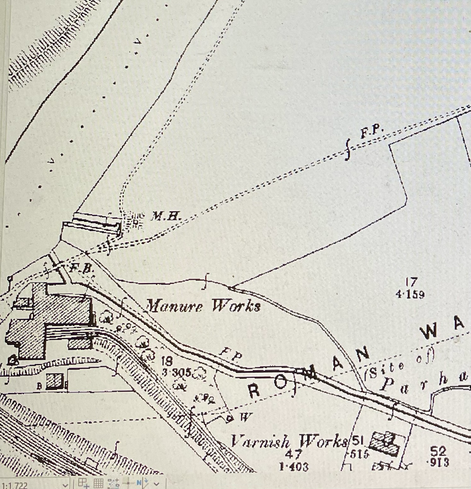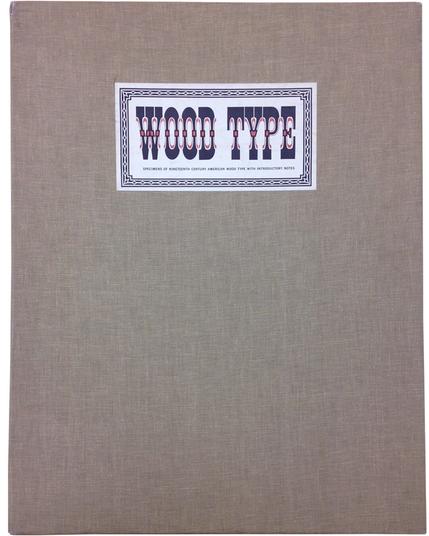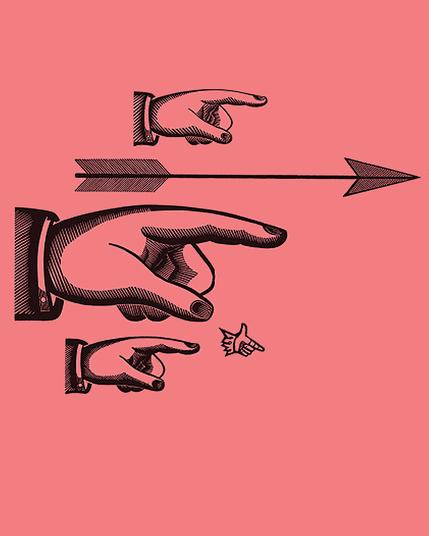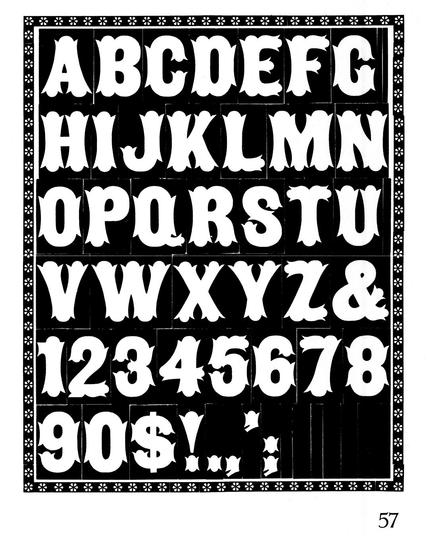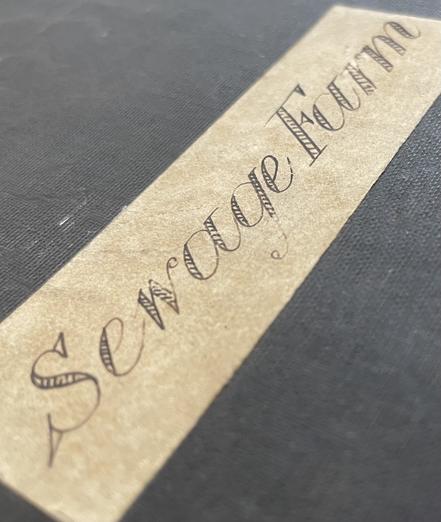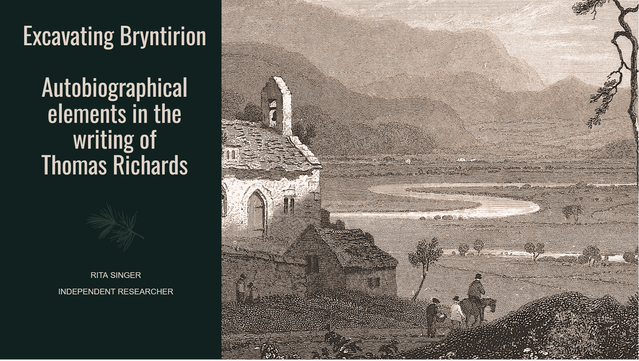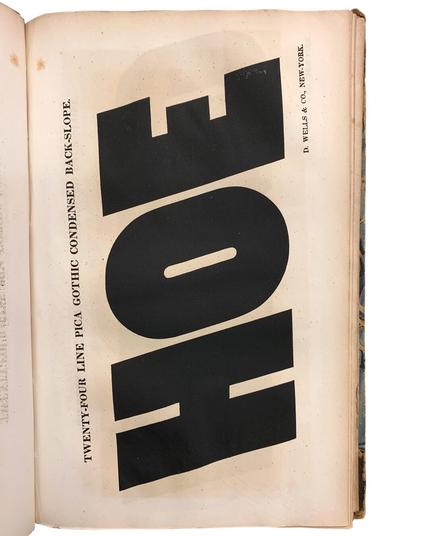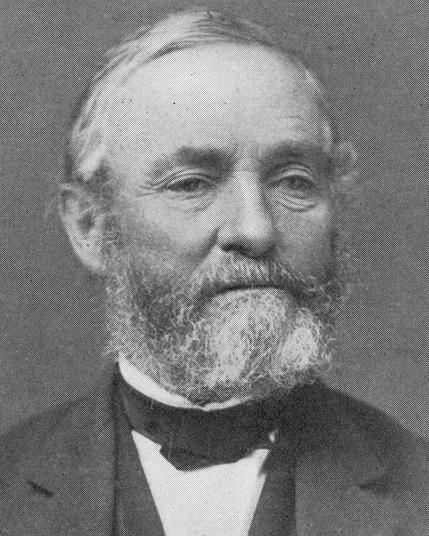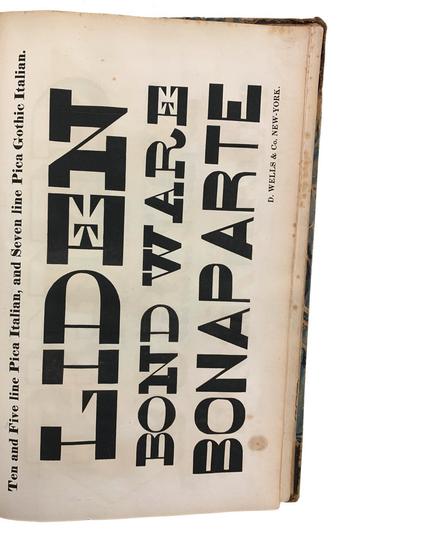It is my hope that with the publication of this list, locations of the remaining complete folio may come to light.
——————————————
#WoodType #TypeSpecimen #type #typography #LetterForms #Lettering #history #archive #design #GraphicDesign #LetterPress #LetterpressPrinting #LetterpressLove #GoodType #TypeMatters #TypeTopia #TypeCollect #NineteenthCentury #AmericanWoodType #Archives #Bibliography
To make a very long story short, I am forty-one and became interested in opera in February of this year. I had been listening to operetta for several years by this point, with special attention to the works of Ivor Novello and Franz Lehar, always preferring original cast recordings, or at least older ones, when possible. Even now, all of the opera singers I like were born prior to 1923. I am interested in learning how to sing for pleasure, and possibly for performance, though not in full operas, as I am totally blind and I wouldn't feel comfortable doing that. I would most likely be singing Neapolitan songs, Italian art songs, a few English parlour songs, and some arias that I enjoy. I am untrained and my voice type has not yet been designated. However, , this is a post that I made reguarding my own discoveries about my vocal range. To summarise, I am a woman, but I feel most comfortable singing in the tenor range and would prefer to stay there. I don't like how high composers force contraltos to sing.
reddit.com/r/opera/comments/1k…
I adore the tenore di grazia voice type and also enjoy lyric tenors. My favourite singer is Tito Schipa, and I wish to learn what he taught, or at least, what he learned. I have the ten exercises that he recorded, including short narrations for each. I wrote about them here, with a transcription of the Italian and an English translation. This way, you will know the school of thought that I am attempting to follow. The one thing I cannot find is the booklet that came with said exercises, which offers more guidance than the record.
reddit.com/r/opera/comments/1k…
Since Schipa left little behind, I began researching his teacher, Alceste Gerunda. It is true that he technically started with Giovanni Albani, but hardly anything is written about him at all in Schipa's biography, and it seems that Gerunda was the one who gave him all of the exercises in any case.
reddit.com/r/opera/comments/1k…
reddit.com/r/opera/comments/1k…
I learned that Gerunda was born in 1847, and that his teacher was Saverio Mercadante. Neither left books, exercises, or published notes. But I found the school where Gerunda taught prior to opening a private one in his home. It has since become a library. They have two books on him that I want and that may shed light on some of his teaching practices. These are "ALCESTE GERUNDA E LA SCUOLA LECCESE DI CANTO" by Silvia Mandurino (ITES 1969) and "IN MEMORIA DEL MAESTRO ALCESTE GERUNDA NE L'AVVIVERSARIO PRIMO DE LA SUA MORTE" by Giulia) Lucrezi (Palumbo.
biblioteche.regione.puglia.it/…
Perhaps, there are anecdotes within them that can help me. They may also have the books that he used to teach, assuming he used any. I have written to them asking if they could assist me, but haven't yet received a response.
In the meantime, I am trying to find information about the pedigogs of his time, so that I can at least learn the ideas and methods that he may have passed down to Schipa. But, of course, there were as many schools of thought as there were teachers. To make matters worse, Gerunda and Schipa themselves appeared to differ in their teaching style. While the former would tell the latter when he made mistakes in exercises, Schipa seemed to just give them and play the piano without giving much commentary. Ironically, Mercadante is said to have taught like that. From what I understand, if I did follow the regular bel canto style, I would need to work on notes, then scales and arpegios, then ornamentation, then songs/arias, all of this taking many years. It seems that Schipa didn't work on breath control, individual notes, tone, tamber, and so on with his students but went straight to vowels and scales. I don't know if this is from his own teacher or if it was his personal philosophy. I have definitely heard of the breath-first and larynx-first schools of thought, so it could stem from there.
People keep saying that i need to see a teacher, but most charge $100 or more per lesson, and at that rate, I can't afford more than two lessons per month. Plus, I want to find someone who knows the old ways, not modern ideas and terminology that I will need to unlearn. As it is, I am already studying harmony from "Harmony its theory and practice" by Ebenezer Prout, and Italian from "An Italian conversation grammar" by N Perini. It's just voice that is giving me a problem.
#AlcesteGerunda #BelCanto #Italy #Lecce #MusicTheory #NineteenthCentury #opera #SaverioMercadante #singing #TitoSchipa #VocalPedigogy
https://www.reddit.com/r/opera/comments/1kic6cl/vocal_range/
I adore the tenore di grazia voice type and also enjoy lyric tenors. My favourite singer is Tito Schipa, and I wish to learn what he taught, or at least, what he learned. I have the ten exercises that he recorded, including short narrations for each. I wrote about them here, with a transcription of the Italian and an English translation. This way, you will know the school of thought that I am attempting to follow. The one thing I cannot find is the booklet that came with said exercises, which offers more guidance than the record.
https://www.reddit.com/r/opera/comments/1ku0n6g/schipas_exercises_with_translated_explanations/
Since Schipa left little behind, I began researching his teacher, Alceste Gerunda. It is true that he technically started with Giovanni Albani, but hardly anything is written about him at all in Schipa's biography, and it seems that Gerunda was the one who gave him all of the exercises in any case.
https://www.reddit.com/r/opera/comments/1ki4vkz/emilio_piccoli_frank_valentino_alceste_gerunda_etc/
https://www.reddit.com/r/opera/comments/1kzobyv/making_progress_on_researching_teaching_method/
I learned that Gerunda was born in 1847, and that his teacher was Saverio Mercadante. Neither left books, exercises, or published notes. But I found the school where Gerunda taught prior to opening a private one in his home. It has since become a library. They have two books on him that I want and that may shed light on some of his teaching practices. These are "ALCESTE GERUNDA E LA SCUOLA LECCESE DI CANTO" by Silvia Mandurino (ITES 1969) and "IN MEMORIA DEL MAESTRO ALCESTE GERUNDA NE L'AVVIVERSARIO PRIMO DE LA SUA MORTE" by Giulia) Lucrezi (Palumbo.
https://biblioteche.regione.puglia.it/SebinaOpac/query/alceste%20gerunda?context=catalogo
Perhaps, there are anecdotes within them that can help me. They may also have the books that he used to teach, assuming he used any. I have written to them asking if they could assist me, but haven't yet received a response.
In the meantime, I am trying to find information about the pedigogs of his time, so that I can at least learn the ideas and methods that he may have passed down to Schipa. But, of course, there were as many schools of thought as there were teachers. To make matters worse, Gerunda and Schipa themselves appeared to differ in their teaching style. While the former would tell the latter when he made mistakes in exercises, Schipa seemed to just give them and play the piano without giving much commentary. Ironically, Mercadante is said to have taught like that. From what I understand, if I did follow the regular bel canto style, I would need to work on notes, then scales and arpegios, then ornamentation, then songs/arias, all of this taking many years. It seems that Schipa didn't work on breath control, individual notes, tone, tamber, and so on with his students but went straight to vowels and scales. I don't know if this is from his own teacher or if it was his personal philosophy. I have definitely heard of the breath-first and larynx-first schools of thought, so it could stem from there.
People keep saying that i need to see a teacher, but most charge $100 or more per lesson, and at that rate, I can't afford more than two lessons per month. Plus, I want to find someone who knows the old ways, not modern ideas and terminology that I will need to unlearn. As it is, I am already studying harmony from "Harmony its theory and practice" by Ebenezer Prout, and Italian from "An Italian conversation grammar" by N Perini. It's just voice that is giving me a problem.
#AlcesteGerunda #BelCanto #Italy #Lecce #MusicTheory #NineteenthCentury #opera #SaverioMercadante #singing #TitoSchipa #VocalPedigogy
Presentation for #AWWE2025 this weekend is go.
This has got to be the closest I've ever finished putting together my paper and presentation ahead of a conference.
#WelshWritingInEnglish #RomanticFiction #NineteenthCentury #Literature #Wales #Tasmania
…………
Wells was the inventor of the routing machine — a lateral revolving cutting tool — which he used to produce the first machine cut wood types in the United States. His first workshop was at 161 Broadway (behind George Long’s book store). He published the first wood type specimen catalog in 1828. The company became D. Wells & Co in 1835, then Wells & Webb when he partnered with E.R. Webb in 1839. Wells retired from wood type manufacturing in 1856.
Wells was also an active abolitionist, and helped run a “station” on the underground railroad in Patterson, NJ helping enslaved humans make their way north to Canada to live as free human beings. Mr. Wells served as Postmaster of Paterson 1861–1874 appointed by Abraham Lincoln.
…………
Image is from _Specimen of Plain and Ornamental Wood Type, cut by machinery_ held in the ATF Library Collection at @columbia_rbml.
…………
#WoodType #router #TypeSpecimen #TypeDesign #letterforms #typography #letterpress #type #design #GraphicDesign #NineteenthCentury #OnThisDay #birthday #bibliography #archives #ArchivesOfInstagram #libraries #collections #excelsior
The Columbian Orator Taught Nineteenth-Century Americans How to Speak
https://www.neh.gov/article/columbian-orator-taught-nineteenth-century-americans-how-speak
#HackerNews #ColumbianOrator #NineteenthCentury #Speaking #Skills #AmericanHistory #PublicSpeaking #Communication
